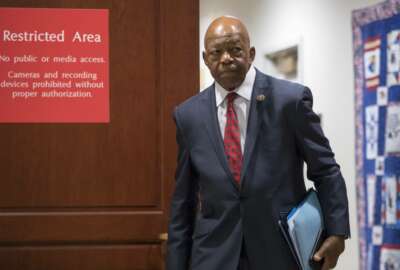

The Office of Personnel Management issued new guidance for agencies to implement the president's three executive orders on employee accountability, official time...
Best listening experience is on Chrome, Firefox or Safari. Subscribe to Federal Drive’s daily audio interviews on Apple Podcasts or PodcastOne.
Agencies with collective bargaining agreements (CBA) that haven’t yet expired will have to wait longer to implement the bulk of the provisions included in the president’s three executive orders on the federal workforce.
But agencies who do have collective bargaining agreements that have expired or rolled over should begin making changes now — regardless of whether the department and its federal union have reopened the CBA to begin negotiations.
The Office of Personnel Management on Thursday offered just a few more details with new guidance that describe how agencies should implement executive orders on employee accountability, official time and collective bargaining, which the president signed May 25.
Agencies “at the earliest moment the law permits, [should] … give any contractually required notice of its intent to alter the terms of such agreement and either reopen negotiations and negotiate to obtain provisions consistent with the EO, or subsequently terminate such provision and implement the requirements of the EO, as applicable under law,” OPM wrote in new guidance. “EOs possess the force of government-wide rules. Therefore, provisions of the EO are effective on the date the CBA expires or rolls over, whether or not the CBA is reopened for negotiations.”
This means, for example, that by July 9, agencies with expired CBAs should ban union representatives from using government property and supplies, enforce official time restrictions on employees, and forbid labor representatives from using official time to prepare or pursue grievances for their colleagues, according to OPM guidance.
“OPM recommends that each agency assess its union time rate for previous years to assist in making appropriate adjustments on authorization and use of taxpayer-funded union time going forward, which should occur at the earliest practicable date permitted by law and subject to appropriate collective bargaining obligations,” the agency wrote in its guidance on the official time order.
Some agencies have already begun making changes, and some organizations do, in fact, have expired contracts.
The Housing and Urban Development Department, for example, told representatives with the American Federation of Government Employees to vacate HUD property by July 15.
The Education Department, which in March opted to implement its own document in lieu of an agreement with AFGE, has an expired contract.
In addition, the Veterans Affairs Department’s current agreement with AFGE is past its three-year coverage date, but the contract indicates that it would remain in place until both parties sign a new one. VA told AFGE last December of its intention to reopen negotiations.
OPM on Thursday released three separate documents, one for each executive order. The documents also include a series of other deadlines, which mostly describe rough dates by which agencies should implement each of the orders’ directives.
For example, agencies should appoint one person to oversee the implementation of the official time and collective bargaining directives by July 13, OPM said.
All agency leaders must approve the designation of a specific person to represent the organization on OPM’s new Labor Relations Working Group. Agencies with at least 1,000 bargaining unit employees are required to submit one name to serve on the group, OPM said. For agencies with less than 1,000 bargaining unit employees, it’s up to the organization’s top leader to choose whether to be a part of the group.
“I believe agency representatives should be assigned to an individual at a very senior level who has the trust of the agency head and serves as an integral part of the leadership team,” OPM Director Jeff Pon wrote in guidance on the collective bargaining EO. “This does not preclude agency representatives from consulting or coordinating with labor relations practitioners.”
The president’s executive order on collective bargaining agreements also sets rough timelines of six weeks or less to set ground rules and a four-to-six-month period for agencies to negotiate new CBAs with unions.
These timelines will apply when current CBAs eventually expire, but for agencies who were already negotiating with a union before the president signed these orders, they were expected to begin abiding by the deadlines as of May 25, the guidance said.
OPM’s new guidance, however, leaves some questions unanswered. The agency, for example, is still determining whether existing regulations execute the provisions in the president’s order on accountability. If OPM decides they do not, it will propose and release “regulatory changes as appropriate,” the agency said.
If OPM does issue new regulations, agencies have 45 days to revise any corresponding policies.
Meantime, agencies roughly have 45 days, wherever possible, to change other policies and implement provisions in the president’s accountability order.
“These presidential requirements are intended to remove unnecessary barriers for timely and effectively addressing misconduct, unacceptable performance and other matters,” Pon wrote. “They further support the steps agencies should already be taking to support plans to maximize employee performance. They do not, however, abrogate provisions of existing collective bargaining agreements.”
The president’s three executive orders have earned their fair share of criticism from federal unions and current and former lawmakers on both sides of the aisle.
A federal judge in late July is expected to hear a motion for summary judgement in the consolidated case from at least 15 unions challenging the president’s EOs.
Nearly two dozen House Democrats and 21 Republicans, along with practically all Senate Democrats, have written the White House to express their concerns and request that the president rescind the orders.
In addition, four members, including House Oversight and Government Reform Committee Ranking Elijah Cummings (D-Md.), Rep. Peter King (R-N.Y.) and former lawmakers and Civil Service Reform Act contributors Jim Leach (R-Iowa) and William Clay Sr. (D-Mo.) filed a “friend-of-the-court” brief in opposition to the orders.
Read OPM’s implementation guidance on the president’s employee accountability, collective bargaining and official time orders here.
Copyright © 2025 Federal News Network. All rights reserved. This website is not intended for users located within the European Economic Area.
Nicole Ogrysko is a reporter for Federal News Network focusing on the federal workforce and federal pay and benefits.
Follow @nogryskoWFED



